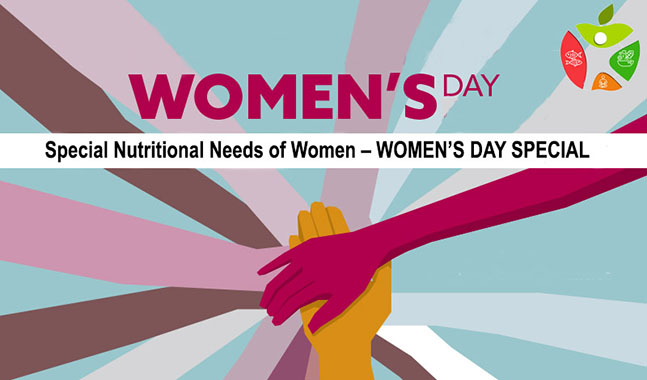Special Nutritional Needs of Women – WOMEN’S DAY SPECIAL
As children the nutritional needs of boys and girls are the same, till about the age of 9 years and the same is reflected in the recommended daily allowances(RDA). As one hits puberty, the requirements of both the genders change, mainly due to the physical and hormonal changes that happen during this period.
Women need fewer calories as compared to their male counterparts but have a higher requirement for certain vitamins and minerals.
Hormonal changes associated with menstruation, child-bearing, and menopause mean that women have a higher risk of anemia, weakened bones, and osteoporosis, requiring a higher intake of nutrients such as iron, calcium (along with vitamin D) and vitamin B9 (folate).
Apart from these nutrients, water, fiber and an antioxidant rich diet is very crucial for a women’s good health and vitality.
Calories:
Men have more lean weight as compared to women, who comparatively have more fat in their bodies. Due to this reason they tend to burn lesser calories and so, require fewer calories from diet.
In general women need around 1200 to 1400 calories depending on also type, duration and intensity of exercise, apart from their age, height and weight.
Calcium:
Calcium along with vitamin D, is important for good bones and healthy teeth. Calcium is also required to regulate heart’s rhythm and for the proper functioning of the nervous system. Calcium is required for many chemical reactions at the cellular level. During the deficiency of calcium in the body these requirements are met with by the resorption of bones, thus weakening the bones and causing osteoporosis.
Rich sources of Calcium are: milk and milk products, sprouts, ragi (finger millet), oats, black gram whole (black chick pea), soybeans, nuts, eggs, chicken and fish, etc.
Also, walk is a good exercise to ensure absorption of calcium and is therefore, good for bone health.
women have different requirements of calcium at different stages of life — specifically, after age 50, or during pregnancy or lactation. Older women require more calcium because after menopause there is decrease in the levels of estrogen. This hormone is very essential for bone health and the absorption of calcium and vitamin D. Decrease in the levels of calcium and Vitamin D can lead to osteoporosis and fractures.
Iron:
Iron is an important mineral and is an important component of hemoglobin and myoglobin, both compounds carry oxygen, one to tissues the other to the muscles. Iron helps the body fight against infections, so is important for the immune system. It is an integral part of many proteins and enzymes which are essential for macronutrient metabolism.
The requirement of Iron is more for women of childbearing age, pregnant and lactating women. Also, vegetarians require more iron compared to non-vegetarians.
Many factors are important in the absorption of iron, and these are:
• Type of iron- haem iron (from non-vegetarian food sources) is absorbed better compared to non – haem iron (from vegetarian food sources)
• If one takes foods rich in vitamin C along with or in the same meal with Iron, it improves its absorption.
• Calcium rich food and tea and coffee effect the iron absorption negatively.
Rich sources of iron are beans (soy, kidney and black), peas, lentils, leafy greens, meat, chicken and organ meats. Many breakfast cereals are now available that have been iron fortified.
Folic Acid:
Folic acid is important for better heart health and protection against certain cancers. The requirement of folic acid is greatly increased during pregnancy to avoid neurological birth defects in the child. It is important for the overall good health and development of the fetus.
Not getting enough folate in diet can also impact one’s mood, leaving one feeling irritable and fatigued, affecting concentration, and making one more susceptible to depression and headaches. It helps in the production of estrogen during menopause.
Folate is found in all the foods that are rich in iron plus those cereals that have been fortified (read labels) with folic acid
Minimum of 8 glasses of water daily along with other liquids and avoiding too many cups of tea coffee and carbonated beverages can ensure sufficient hydration.
Eating a varied diet high in fruits, vegetables and whole grains will ensure intake of sufficient amounts of disease preventing antioxidants and fiber in the diet
If a lady is eating sufficient quantities of a varied diet including all food groups, and not fasting or is not on a crash diet, she may not require to take any supplementation of these nutrients. But if she is not taking a varied diet or if she is dieting then she may require to take extra supplementation.
Also during pregnancy and lactation (nursing mothers) women require extra Iron, folic acid and Calcium. This is because of increased demands of the fetus and for the production of milk. After menopause, women require extra Calcium for good bone health. As during that period absorption of calcium reduces.
Walk or other aerobic exercises should form a part of a woman’s daily schedule in order to maintain good overall health apart from good nutrition. It is very important to maintain a healthy life style and also the weight.
Contact : Best Nutritionist Near Me

